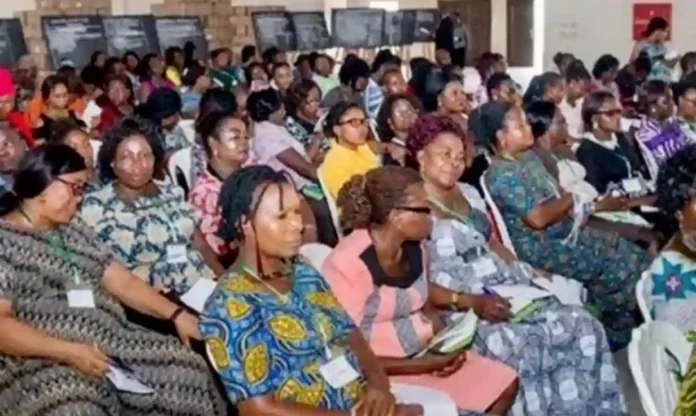The Teachers Registration Council of Nigeria has partnered with Plan International Nigeria to train teachers from various fields ahead of the newly reformed Professional Qualifying Examination. The five-day technical workshop on the reformed Professional Qualifying Examination and Digital Literacy Model Design took place in Abuja, where key education stakeholders discussed how to strengthen teacher capacity and improve learning outcomes across the country.
Ronke Soyombo, registrar of the Teachers Registration Council of Nigeria, explained that the new Professional Qualifying Examination has reduced 23 subjects to five core competency domains. She identified the domains as literacy, numeracy, digital literacy, pedagogy, and safeguarding. According to her, the new structure will improve learner performance and modernise teacher assessments. She noted that 26,000 teachers registered for the forthcoming examination in the last four months, adding that by 2027, every practising teacher in Nigeria must be fully registered as a TRCN professional.
Ms Soyombo stressed the importance of standards in teacher development. “So, everything is about standard to us. And as a result, we are focusing on foundational literacy, mathematics, digital literacy, pedagogy, and safeguarding.” She added that safeguarding remains a priority because every child must feel protected in school. She explained that teachers must know how to respond when a child reports abuse and must also understand that support exists for teachers who may face abuse. She said participants for the workshop were selected from basic and tertiary education levels, including specialists in mathematics, literacy, and information technology. “So, what we did is to ensure that everybody is selected from different areas so that places are properly covered and professionally covered as well,” she said.
Gbenga Adewole, a researcher at the University of Ibadan, highlighted the urgency of developing a digital literacy training model that supports better learning outcomes, especially as classrooms increasingly adopt technology-driven methods.
Tanimudari Zakari, project coordinator at Plan International Nigeria, said Nigeria’s teacher certification system is being upgraded to better suit classroom realities, including the needs of crisis-affected regions such as Adamawa and Sokoto. He explained that the shift from 23 subjects to five core domains aligns the Professional Qualifying Examination with global standards. “Nigeria is modernising teacher certification to meet real classroom needs, especially in crisis-affected states like Adamawa and Sokoto,” he said. He added that the introduction of a digital teacher registration portal and a digital literacy training model will strengthen teachers’ readiness for the new examination.
Mr Zakari described the partnership between the Teachers Registration Council of Nigeria and Plan International Nigeria as a major driver of education reform, aimed at improving learning outcomes for children nationwide and advancing teacher professionalisation. He said the organisation aims to empower 20 million girls by 2028 and increase advocacy for education system reforms.
Participants at the workshop included representatives of the Teachers Registration Council of Nigeria, the Federal Ministry of Education, universities, colleges of education, curriculum and assessment experts, QEDA, Plan International Nigeria, and other development partners.

